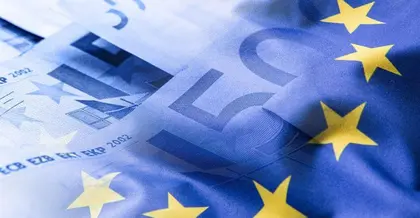As Moscow cuts gas to Europe, hoping to freeze Europe into reducing sanctions, the EU prepares another tranche of support for Ukraine.
During a phone conversation Sunday with European Commission President Ursula von der Ley, President Zelensky expressed the need for the European Union to further tighten sanctions on Russia.
JOIN US ON TELEGRAM
Follow our coverage of the war on the @Kyivpost_official.
Zelensky wrote on social media that he had had “a phone conversation with President of the European Commission Ursula von der Leyen. Discussed the allocation of the next tranche of EU macro-fin [macro-financial] aid ASAP. Emphasized the need to prepare the eighth package of sanctions, including a ban on issuing visas to Russian citizens.”
In recent weeks, the proposal to ban Russians from receiving European Union visas, either those known as Schengen visas or a total ban on all visas, has grown in popularity in European news. Some European Union members have already taken steps to limit Russians from being able to vacation within the boundaries of the Union.
Zelesnky mentioned to von der Leyen that the European Union’s coming sanctions against Russia, the eight such packages since Russia began its illegal invasion of Ukraine on February 24 of this year, should specifically ban the issuance of visas to Russian citizens.
Zelensky mentioned that the call included “steps to limit Russia’s excess profits from the sale of oil and gas. Considered the possibility of a quick assessment by the European Commission as soon as Ukraine fulfills its seven recommendations.”
Over the weekend, Russia announced that the Nord Stream 1 pipeline, by which gas to Europe is typically shipped, would be closed due to a leak that had been discovered. According to Russians, the leak was caused by the West’s sanctions on Moscow. However, foreign leaders commented that it was more probable that Russia was simply seeking to pressure Europe to reduce sanctions.
Following Russia’ announcement, Zelensky had said in a video message that Russia would seek to “further increase the energy pressure on Europe. The pumping of gas through Nord Stream has completely stopped. Why do they do it? Russia wants to destroy the normal life of every European – in all countries of our continent. It wants to weaken and intimidate all of Europe, every state.”
The reasoning for this, argued the Ukrainian leader, is that Russia was effectively attacking Europe – where Russia “cannot do it with conventional weapons, it does it with energy weapons. It is trying to strike with poverty and political chaos where it cannot yet strike with missiles.”
His solution was that “we all in Europe need even more unity, even more coordination, even more help to each other,” going on to say that during this “winter, Russia is preparing for a decisive energy strike against all Europeans. And the key answers to this should be two things: first, our unity – unity in defense against a terrorist state – and the second, the strengthening of our own pressure on Russia. This is the strengthening of all levels of sanctions and limiting Russia’s oil and gas revenues.”
In the past few days, Gazprom, which is a majority Russian state-owned enterprise, released an ad with a song that’s lyrics include “It will be a big winter,” juxtaposing photos of Gazprom and of the European Union. Gazprom has struggled since Western sanctions were implemented. Unlike oil, which can be sold to Asia, only a fraction of all gas produced in Russia can be sold as liquefied natural gas (LNG) as Russia lacks the capacity to produce more LNG than current levels.
Gas pipelines to Asia, which Russia began building before the war, are expected to take years more to complete.
You can also highlight the text and press Ctrl + Enter



